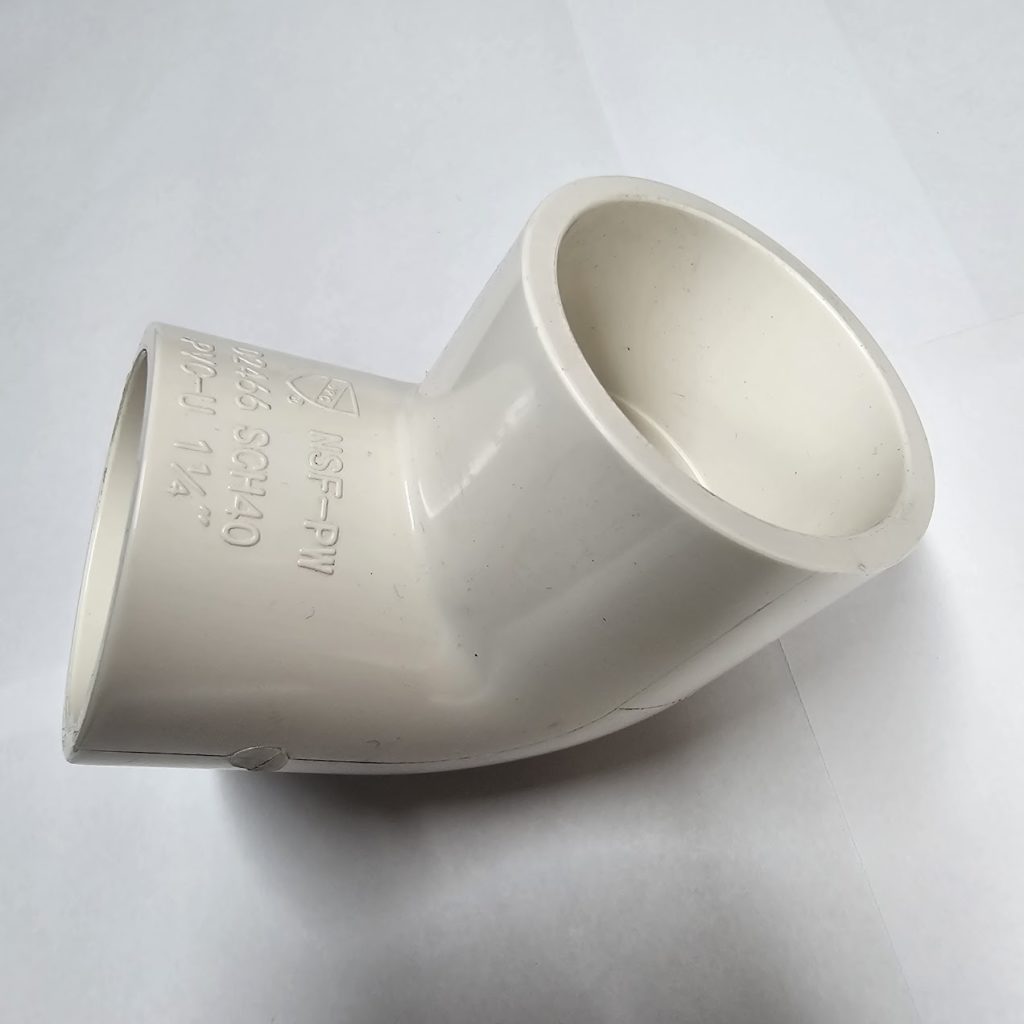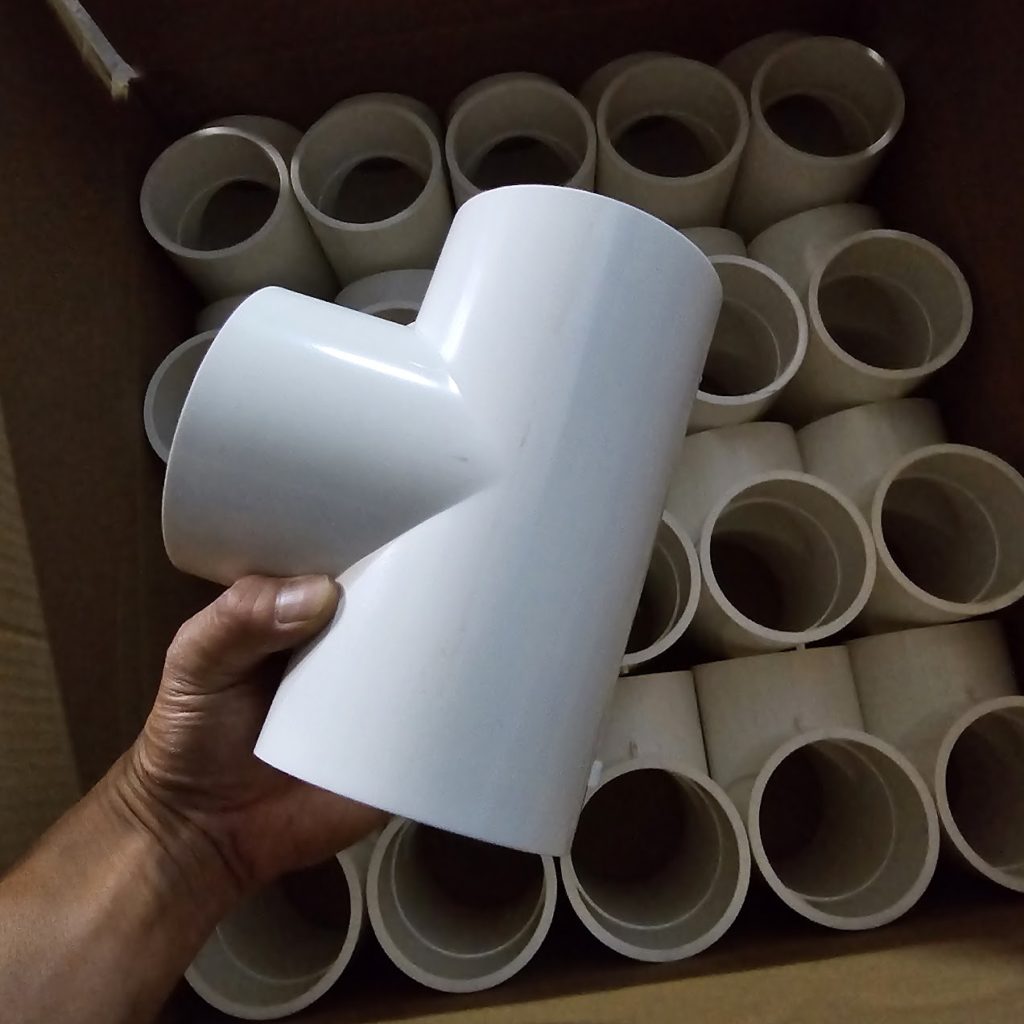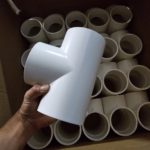
What is the pressure rating for Schedule 40 PVC fittings?
The maximum pressure rating for Schedule 40 PVC fittings varies depending on the specific fitting, temperature, and application, but it is typically up to 120-150 PSI.
Are Schedule 40 PVC fittings suitable for outdoor use?
Yes, Schedule 40 PVC fittings are suitable for outdoor use due to their UV resistance and durability in harsh environments.
Can Schedule 40 PVC fittings be used with potable water?
Yes, Schedule 40 PVC fittings are suitable for use with potable water due to their non-toxic and corrosion-resistant properties.
How do I connect Schedule 40 PVC fittings?
Schedule 40 PVC fittings can be connected using solvent welding, threading, or flanging, depending on the specific fitting and application.
What is the difference between Schedule 40 and Schedule 80 PVC fittings?
Schedule 40 PVC fittings have a thinner wall thickness than Schedule 80 fittings, making them less resistant to pressure and corrosion, but still suitable for many applications.
Can Schedule-40 PVC fittings be used for both plumbing and irrigation applications?
This question is common because Schedule-40 PVC fittings are versatile and widely used in various applications. People want to know if they can safely use these fittings for both residential plumbing systems and outdoor irrigation without compromising performance or safety. The answer is generally yes, as Schedule-40 PVC fittings are suitable for both types of applications, provided they are used within
What is the temperature range for Schedule 40 PVC fittings?
Schedule 40 PVC fittings typically have a temperature range of 32°F to 140°F (0°C to 60°C).
Within this range, the fittings maintain their structural integrity and pressure rating. However, as the temperature approaches the upper limit, the pressure rating of the fittings decreases. It's important to consider this when designing systems that operate near or above room temperature. For applications requiring higher temperature tolerance, CPVC fittings may be more appropriate, as they can handle temperatures up to 200°F (93°C).
Can Schedule 40 PVC fittings be used with chemicals or corrosive materials?
Schedule 40 PVC fittings are resistant to many chemicals and corrosive materials, but not all. PVC is generally resistant to:
- Acids (except concentrated sulfuric and nitric acids)
- Alkalis
- Salts
- Water
- Most organic solvents
However, PVC is not resistant to:
- Concentrated sulfuric and nitric acids
- Chlorinated hydrocarbons
- Aromatic hydrocarbons
- Ketones
- Esters
- Some organic solvents (e.g., acetone, MEK)
When using Schedule 40 PVC fittings with chemicals or corrosive materials, consider the following:
- Check the manufacturer's chemical resistance charts and recommendations
- Ensure the PVC fitting is specifically rated for use with the intended chemical or material
- Follow proper installation, handling, and maintenance procedures
- Consider using specialized PVC fittings or alternative materials (e.g., CPVC, PVDF) for harsh chemical applications
Remember, chemical resistance can vary depending on factors like concentration, temperature, and exposure duration. Always consult the manufacturer's guidelines and take necessary precautions to ensure safe and effective use.
How do I determine the correct size and type of Schedule 40 PVC fitting for my application?
To determine the correct size and type of Schedule 40 PVC fitting for your application, follow these steps:
- Identify the pipe size and type: Determine the size and type of pipe you are connecting to (e.g., 1/2", 3/4", 1", etc.).
- Consider the application: Think about the fluid being transported (e.g., water, gas, chemical), pressure, temperature, and flow rate.
- Choose the fitting type: Select the appropriate fitting type (e.g., elbow, tee, coupling, valve) based on your application's requirements.
- Check the fitting's pressure rating: Ensure the fitting's pressure rating meets or exceeds your application's requirements.
- Consider the connection type: Decide on the connection type (e.g., solvent weld, threaded, flanged) based on your application's needs.
- Verify the material compatibility: Ensure the PVC fitting is compatible with the fluid being transported and any other materials in the system.
- Consult the manufacturer's specifications: Check the manufacturer's specifications and recommendations for the specific fitting you are using.
- Use a fitting selection guide or chart: Utilize a fitting selection guide or chart to help determine the correct size and type of fitting.
Some additional factors to consider:
- Flow rate: Ensure the fitting's flow rate meets your application's requirements.
- Temperature range: Verify the fitting's temperature range is suitable for your application.
- Chemical resistance: Ensure the fitting's material is resistant to the chemicals or fluids being transported.
By following these steps, you can determine the correct size and type of Schedule 40 PVC fitting for your specific application.

-
 3/4 in. Schedule 40 PVC 90-Degree Elbow NSF Pipe Fitting SCH40 ASTM D2466$0.28 As low as $0.2713732 in stock
3/4 in. Schedule 40 PVC 90-Degree Elbow NSF Pipe Fitting SCH40 ASTM D2466$0.28 As low as $0.2713732 in stock -
 3/4 in. Schedule 40 PVC Tee 3-Way Pipe Fitting NSF/ASTM SCH40 ASTM D2466$0.35 As low as $0.3212740 in stock
3/4 in. Schedule 40 PVC Tee 3-Way Pipe Fitting NSF/ASTM SCH40 ASTM D2466$0.35 As low as $0.3212740 in stock -
 3/4 in. PVC Union w/ EPDM O-Ring Schedule-40 Pipe Fitting Slip/Socket ASTM D2466/F1970Rating:100%$0.72 As low as $0.654001 in stock
3/4 in. PVC Union w/ EPDM O-Ring Schedule-40 Pipe Fitting Slip/Socket ASTM D2466/F1970Rating:100%$0.72 As low as $0.654001 in stock -
 1/2 in. PVC Compact Ball Valve Schedule-40 Pipe Fitting Slip/Socket$0.68 As low as $0.613165 in stock
1/2 in. PVC Compact Ball Valve Schedule-40 Pipe Fitting Slip/Socket$0.68 As low as $0.613165 in stock


























